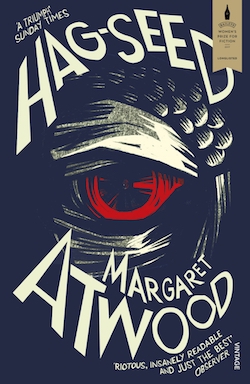Published by Hogarth Press, 2016, 320 pages.

Margaret Atwood never disappoints, and this reworking of The Tempest (as part of a series commissioned by Hogarth Press) is no exception.
Felix, the artistic director of the Makeshiweg Festival in Canada, has been working on what he believes is his masterpiece, an over-the-top production of The Tempest. The play was meant to be a tribute to Miranda, the three-year-old daughter he lost to meningitis. The day before it opens, Felix loses his post in a coup orchestrated by his assistant, Tony, with the help of Sal O’Nally, the Heritage Minister. Felix is devastated: he has not only lost his career but his social standing.
He retreats to a shack to lick his wounds, accompanied only by the ghost of Miranda, who grows as the years go by. He is aware that she is only a figment of his imagination, but he can’t let her go, and spends his time talking to her and stalking Tony and Sal on the internet.
Nine years go by and worried he is losing his mind, he decides to go back into the world. Calling himself Mr. Duke, he gets a job as a theatre director at a prison, the Fletcher County Correctional Institute, as part of an experimental programme called Literacy through Literature. Felix decides that the men will put on only Shakespeare plays, “wizardry in the slammer”, as he calls it. The job seems to bring out his innate talent as director: he earns the prisoners’ respect and encourages them to engage with the play. He is open to the prisoners’ interpretations and changes, insists that the only swear words allowed in his classes are to be taken from the play, and as a final assignment, asks them to imagine the future lives of their characters. To avoid stage fright and unforeseen situations, the final play is recorded and is played to the entire prison on TV screens. The programme is a big success.
But Felix has not forgotten the two men who deposed him. While he retreated from the world, Tony has been clambering up the greasy pole, and is now Heritage Minister. Sal is campaigning to be elected the leader of the federal party. Between them, they have decided to shut down Literacy through Literature but for form’s sake, will be at the prison to see the prisoners’ new play. So far, they’ve been out of Felix’s reach, but now they are walking into his kingdom, unaware that Mr. Duke is really Felix. It is an irresistible opportunity. “How to grasp them, how to enclose them, how to ambush them? Suddenly revenge is so close he can almost taste it. It tastes like steak, rare. Oh, to watch their two faces! Oh, to twist the wire! He wants to see pain. ‘We’re doing The Tempest,’ he says.”
The result is wickedly funny. Getting hardened criminals interested in The Tempest is a challenge, and Felix rises to it. He even manages to persuade one of them to play Ariel, who is transformed from a fairy with wings to an alien creature in a blue raincoat and shower cap. With a bit of help from a couple of his criminal disciples, Felix puts together a cunning plan to get his back on the two men, and Atwood keeps you guessing until the end whether it will work or go horribly wrong.
The book is brilliantly put together. The entire structure is based on The Tempest, with Felix as Prospero, thrown out of his kingdom by Tony and Sal (Antonio and Alonso). His island kingdom is the prison. There is another Tempest within this larger story: the re-enactment of the play, which is actually two re-enactments: one that the rest of the prison sees and the other entirely for the benefit of Sal and Tony. All these layers come together in the grand finale.
Hag-Seed is an absolute delight and one of the most enjoyable books I’ve read this year. Felix carries the story: he is manipulative, self-centred and obsessive, but utterly engaging. You don’t have to like Shakespeare to enjoy it, but if you’re interested or need to be reminded—and it does add to the enjoyment of the book—there is a helpful summary of the play at the end. I hope that the other books in the series are as good.
Read reviews of some of the others in the series: Jo Nesbo’s Macbeth; Jeanette Winterston’s The Gap of Time and Edward St Aubyn’s Dunbar.

Great review! I’m studying The Handmaid’s Tale for A-Level English Literature and I would love to give more of Atwood’s novels a try – this one sounds like a good place to start.
She’s very good. I’m watching the TV series of The Handmaid’s Tale and finding it quite hard to watch–very close to the bone. Much more so than the book.
Pingback: Best books of 2018 | Talking About Books
Pingback: Macbeth: Jo Nesbo, translated by Don Bartlett | Talking About Books
Pingback: The Gap of Time: Jeanette Winterston | Talking About Books
Pingback: Books for the lockdown | Talking About Books
Pingback: Dunbar: Edward St Aubyn – Talking About Books